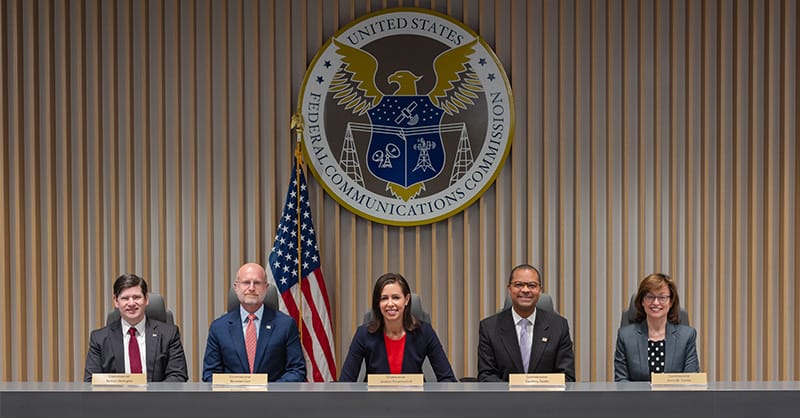
cyber security
Industry advocates want clarification as the FCC moves ahead with cybersecurity funding for educational institutions

 Photo of the five FCC Commissioners, from the FCC website
Photo of the five FCC Commissioners, from the FCC website
WASHINGTON, June 3, 2024- The Federal Communications Commission on Thursday is likely to adopt an order that will provide millions of dollars to fund a pilot program intended to harden schools and libraries against cyberattacks that can cripple critical online services for days at a time.
The proposal, first introduced last November, will provide $200 million in Universal Service Fund support to evaluate effective firewall services and subsidize cybersecurity software for K-12 schools and libraries over a three-year period.
“With this pilot program, we aim to better understand these issues and how the FCC can leverage its resources to help address evolving cyber threats,” FCC Chairwoman Jessica Rosenworcel said in a November, 2023 statement.
The program provides eligible schools and libraries with a minimum of $15,000 and a maximum of $1.5 million to purchase eligible cybersecurity services, estimating a cost of around $13.60 per-student in the case of schools.
The impetus behind the proposal, Rosenworcel said, was the “growing problem” of cyber-attacks.
Notably, the meeting comes just two weeks after the Seattle Public Library was allegedly hit with a major ransomware attack, forcing the library to take its servers offline. The library, as of May 31, had yet to restore much of its in-house and online features.
“Schools… have been targeted with ransomware attacks, resulting in everything from network malfunctions to student privacy vulnerabilities to unexpected expenses to get their systems back online,” Rosenworcel said in her statement.
Rosenworcel said the new pilot program will empower federal, state, and local officials with actionable data and services to address these issues.
While reaction to Rosenworcel’s proposal has generally been positive, some in the library community have requested clarification over unclear wording with regard to funding.
A letter to the FCC, submitted by the American Library Association and others, pointed to the lack of specificity over whether the outlined estimated funds are overall or annual.
For example, while the proposal offers a maximum and minimum subsidy range between $15,000 and $1.5 million, it does not specify whether the sum will be an annual allocation over the next three years.
The letter also echoed the concerns of large library systems that do not know if they will receive a fair share of funding under the FCCs formula. The program provides “up to $175,000” for libraries with over 11 locations, meaning library systems with potentially dozens of units could be offered reduced financial support.
Aside from the clarifications, the ALA-led group remained eager for the program to begin.
“We encourage the Commission to provide increased funding and a quick timeline for upgrading the E-rate program to provide needed financial support to protect these vulnerable school and library networks,” the ALA group wrote.
